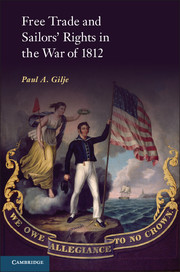12 - Contested Commerce
Published online by Cambridge University Press: 05 March 2013
Summary
In the decade before the War of 1812 the contest over commerce appeared on both the international and domestic fronts. When Thomas Jefferson became president in 1801, many of the problems with France and Great Britain that had plagued the foreign policy of the 1790s had subsided. John Adams had settled the Quasi War with France; the British had accepted the American role as a neutral carrier in the Polly decision, which permitted the re-export trade; and Great Britain and France had agreed to the Peace of Amiens, temporarily ending their conflict. In 1803 the British and the French resumed hostilities and, operating from more traditional assumptions about diplomacy, used trade as a weapon of war. Caught in the middle between two belligerent nations, the United States struggled to find some means to sustain its commerce with both. Beginning in 1806, when the crisis intensified, the Republicans in Congress passed a series of measures to pressure both the French and the British to accept American trade without any restrictions. During the ensuing debates Republicans and Federalists called upon their shared revolutionary values to control the language and legacy of free trade. Although the Federalists emphasized open markets in opposition to government measures limiting trade, they merged the idea of free trade as unrestricted commerce with the concept of free trade as neutral rights. Republicans responded by asserting that they were the ones who were defending the ideal of free trade. They, too, mixed free trade as neutral rights with free trade as open commerce, but stressed the former over the latter. After the repeal of the Embargo Act of 1807, as the United States continued to seek a peaceful means to coerce Great Britain and France to ease or even end their commercial restrictions, free trade as an ideal and as a slogan became firmly entrenched in the political rhetoric of both parties, with each side using the multiple meanings and ambiguity of the term to its own advantage in an effort to seize the heritage of the American Revolution.
- Type
- Chapter
- Information
- Free Trade and Sailors' Rights in the War of 1812 , pp. 148 - 170Publisher: Cambridge University PressPrint publication year: 2013



